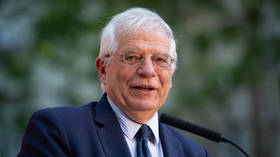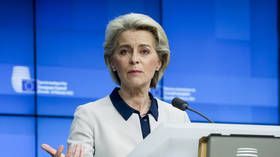West made mistakes in relations with Russia – EU

Josep Borrell, the European Union’s high representative for foreign affairs and security policy, has conceded that the West has made errors in its relations with Russia.
Speaking to France’s TF1 channel on Thursday, Borrell said he was “ready to admit that we made a number of mistakes and missed the chance to get closer with Russia.” The EU’s most senior diplomat went on to acknowledge that there were things “we could have done better,” as well as “things which we offered and then failed to realize, such as … promises that Ukraine and Georgia would become part of NATO.” He said he was of the view that “making promises that you can’t make good on is a mistake.”
He also noted that, “following the collapse of the Soviet Empire, the Russians suffered severely,” which, in his eyes, gave rise to “a kind of grudge that Putin is exploiting.”
Most of the interview, however, was devoted to harsh criticism of Russia’s military campaign against Ukraine, which Moscow launched on February 24.
Borrell described the Kremlin’s offensive as a “completely unjustified and gratuitous war which is becoming more and more brutal and completely unacceptable for the civilized world.” He warned that “we have entered a new page in the history of Europe, a new page in global geopolitics,” adding that he expected relations with Russia to be “radically different after what has just happened.”
The diplomat proceeded to accuse Russian forces of disregarding the presence of civilians in its attacks on Ukrainian cities, adding that “Mariupol [was] undoubtedly a war crime.” He alleged that, as Russia had so far been “incapable of taking the cities” due to what he described as “very strong” Ukrainian resistance, Moscow had resorted to indiscriminately bombing them instead, just like “in Syria or Chechnya.”
Asked if he thought Vladimir Putin would ever be brought before the International Criminal Court in The Hague, Borrell said that, while such a scenario was largely hypothetical, he thought there were sufficient allegations on which to try the Russian president.
Borrell revealed that his office was overseeing an EU-wide scheme aimed at facilitating weapons deliveries to Ukraine for the first time in the bloc’s history. He said a “team of 200 officers from all the European armies,” under the command of a French admiral and an Italian general, was ensuring Ukraine’s demand was met by the EU’s supply. Individual member states were providing weapons and equipment, most notably ammunition, fuel, and anti-tank missiles, he explained, and Brussels was picking up the tab.
He refused to go into detail regarding the delivery methods and border crossings that were being employed for the shipments, however.
Russia’s Ministry of Defense has consistently denied allegations that its forces are targeting civilian infrastructure in Ukraine. It accuses the Ukrainian Army and militias of taking up positions in residential areas and using civilians as a human shield. Commenting on recent media reports of a Russian air strike on a maternity hospital in the city of Mariupol, Moscow dismissed the story as “fake news.”
Speaking after talks with his Ukrainian counterpart in Antalya, Turkey, on Thursday, Russian Foreign Minister Sergey Lavrov warned the West that the weapons it was shipping en masse to Ukraine, particularly portable anti-aircraft missiles, could end up in the hands of terrorists, posing a threat to civilian aircraft.
Moscow attacked its neighbor in late February, following a seven-year standoff over Ukraine’s failure to implement the terms of the Minsk agreements, and Russia’s eventual recognition of the Donbass republics in Donetsk and Lugansk. The German- and French-brokered protocols had been designed to regularize the status of those regions within the Ukrainian state.Russia has now demanded that Ukraine officially declare itself a neutral country that will never join the US-led NATO military bloc. Kiev insists the Russian offensive was completely unprovoked and has denied claims it was planning to retake the two republics by force.













